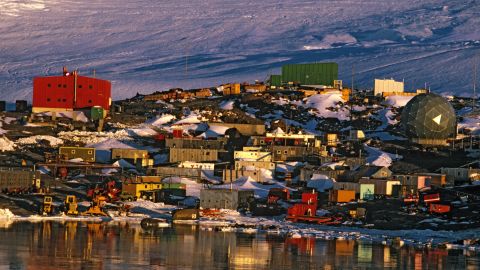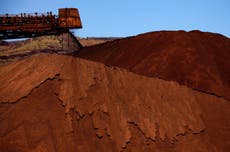PATRIARCHY IS EVERYWHERE
Women working at Australia’s Antarctica camps were sexually harassed, report finds‘Women have to work in the field with their abusers for weeks at a time’
Alisha Rahaman Sarkar
Australian women working at research stations in Antarctica have endured a widespread and predatory culture of sexual harassment in the male-dominated field, a new report has found.
Women experienced sexual harassment in the form of requests for sex, uninvited touching, displays of offensive or pornographic material and sex-based insults, according to the report, based on the external review of culture at Antarctic research stations.
The women also described “a homophobic culture” on stations.
Some women claimed they felt compelled to hide their menstruation while on field missions because of the fear of being judged as incompetent by their male counterparts.
They were also forced to ration menstrual products such as tampons and at times improvise due to lack of availability, revealed the report, commissioned by the Australian Antarctic Division (AAD).
Recommended
The AAD runs four permanent research stations akin to “small towns” in Antarctica and the sub-Antarctic.
Meredith Nash, who wrote the report, said some women feel unsafe at the Antarctic stations and it would be unethical to continue sending women until their safety can be assured.
“Women have to work in the field with their abusers for weeks at a time because they simply can’t leave,” Ms Nash told the Australian Broadcasting Corp (ABC).
The Nash inquiry was initiated after several women raised harassment complaints.
Australia’s environment minister Tanya Plibersek said she was “gobsmacked” by the findings of the report. “As a minister, I take a zero-tolerance response to sexual harassment in any workplace I am responsible for,” she said.
“I have been very clear with the department. We need to make sure that every person working either at head office or in the Antarctic feels safe and if they make a complaint, they can make that complaint without any fear of victimisation,” she told ABC.
“I hope the report will be a catalyst for further change.”
Following the damning findings, Kim Ellis, the director of AAD, said in a statement to staff members that the behaviours needed to improve and urged people to report concerns.
“I am deeply concerned by the experiences it describes at our workplaces where people have been sexually harassed, discriminated against and excluded,” Mr Ellis said.
“It doesn’t matter how many people may have experienced this behaviour – we know that under-reporting is almost certainly a factor – the fact that anyone at all experiences this treatment is not OK,” he added.
‘Predatory,’ widespread sexual harassment on Australia’s Antarctic research bases, report finds
By Martin Goillandeau and Tara Subramaniam, CNN
Sat October 1, 2022

Mawson Station, Australian Antarctic Territory, Antarctica.Auscape/Universal Images Group/Getty Images
CNN —
Australian women working on research bases in Antarctica have been plagued by a widespread culture of sexual harassment, a recently released report found.
The report, commissioned by the Australian Antarctic Division (AAD), notes that the women reported unwelcome requests for sex, inappropriate sexual comments and displays of offensive or pornographic material.
“Given the underrepresentation of women in the AAP (Australian Antarctica Program) (especially during winter) some women also described the culture as ‘predatory’ and objectifying,” the report said, while other participants described a homophobic culture on stations.
The report, conducted by associate professor Meredith Nash from the University of Tasmania, also revealed female expeditioners feel they “must go to great lengths to make their menstruation invisible” and go through “additional psychological and physical labor to manage” menstruation, including changing their menstrual products without privacy or adequate sanitation.
Australia’s Environment and Water Minister Tanya Plibersek said in an interview with Australian public broadcaster ABC she was “gobsmacked” to read the report.
“Let me be absolutely clear: there is no place for sexual harassment or inappropriate behavior in any workplace,” Plibersek said in a statement Thursday, calling the treatment described in the report as “unacceptable.”
The report made recommendations on how to change the culture at the stations, including the creation of an “equity and inclusion task force.”
Plibersek said Australia’s Department of Climate Change, Energy, the Environment and Water is working through the recommendations.
Australia is not alone in combating these issues.
The report on the Australian research bases in Antarctica comes a month after the US National Science Foundation (NSF) released an assessment of the US Antarctic Program which found that “sexual harassment, stalking, and sexual assault are ongoing, continuing problems in the USAP community.”
By Martin Goillandeau and Tara Subramaniam, CNN
Sat October 1, 2022

Mawson Station, Australian Antarctic Territory, Antarctica.Auscape/Universal Images Group/Getty Images
CNN —
Australian women working on research bases in Antarctica have been plagued by a widespread culture of sexual harassment, a recently released report found.
The report, commissioned by the Australian Antarctic Division (AAD), notes that the women reported unwelcome requests for sex, inappropriate sexual comments and displays of offensive or pornographic material.
“Given the underrepresentation of women in the AAP (Australian Antarctica Program) (especially during winter) some women also described the culture as ‘predatory’ and objectifying,” the report said, while other participants described a homophobic culture on stations.
The report, conducted by associate professor Meredith Nash from the University of Tasmania, also revealed female expeditioners feel they “must go to great lengths to make their menstruation invisible” and go through “additional psychological and physical labor to manage” menstruation, including changing their menstrual products without privacy or adequate sanitation.
Australia’s Environment and Water Minister Tanya Plibersek said in an interview with Australian public broadcaster ABC she was “gobsmacked” to read the report.
“Let me be absolutely clear: there is no place for sexual harassment or inappropriate behavior in any workplace,” Plibersek said in a statement Thursday, calling the treatment described in the report as “unacceptable.”
The report made recommendations on how to change the culture at the stations, including the creation of an “equity and inclusion task force.”
Plibersek said Australia’s Department of Climate Change, Energy, the Environment and Water is working through the recommendations.
Australia is not alone in combating these issues.
The report on the Australian research bases in Antarctica comes a month after the US National Science Foundation (NSF) released an assessment of the US Antarctic Program which found that “sexual harassment, stalking, and sexual assault are ongoing, continuing problems in the USAP community.”

No comments:
Post a Comment